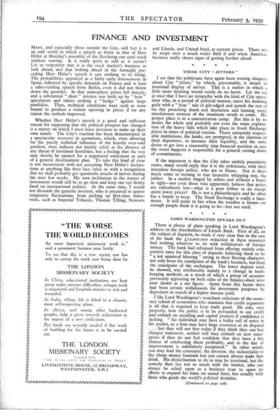LORD WARDINGTON SPEAKS OUT
There is plenty of plain speaking in Lord Warclington's address to the shareholders of Lloyds Bank. First of all, on the subject of deposits, he made it very clear that in the case of his bank the LI2,000,000 reduction in these resources had nothing whatever to do with withdrawals of foreign money. The bank had refrained from offering unduly com- petitive rates for this class of deposits believing them to be " a not unmixed blessing " owing to their fleeting character, not only from the standpoint of the bank's business, but from the standpoint of the exchanges. The lower deposit total, he showed, was attributable mainly to a change in book- keeping methods, as a result of which a group of accounts previously appearing on both sides of the balance-sheet were now shown as a net figure. Apart from this factor there had been certain withdrawals for investment purposes. by depositors in search of a higher income yield. There is plenty of plain speaking in Lord Warclington's address to the shareholders of Lloyds Bank. First of all, on the subject of deposits, he made it very clear that in the case of his bank the LI2,000,000 reduction in these resources had nothing whatever to do with withdrawals of foreign money. The bank had refrained from offering unduly com- petitive rates for this class of deposits believing them to be " a not unmixed blessing " owing to their fleeting character, not only from the standpoint of the bank's business, but from the standpoint of the exchanges. The lower deposit total, he showed, was attributable mainly to a change in book- keeping methods, as a result of which a group of accounts previously appearing on both sides of the balance-sheet were now shown as a net figure. Apart from this factor there had been certain withdrawals for investment purposes. by depositors in search of a higher income yield.
I like Lord Wardington's trenchant criticisms of the mone- tary school of economists who maintain that credit expansion is all that is required to keep trade good. He asks, very properly, how the public is to be persuaded to use credit and embark on spending and capital projects if confidence is lacking. " An individual may have a bulky roll of notes in his pocket, or a firm may have large resources at its disposal . . . but they will not buy today if they think they can buy cheaper tomorrow, neither will they embark on new enter- prises if they do not feel confident that they have a fair chance of conducting them profitably, and so the day of improvement is indefinitely postponed." In other words, you may lead the consumer, the investor, the industrialist to the cheap money fountain but you cannot always make him drink. His disinclination to do so may be irrational, but the remedy then lies not so much with the banker, who can always be relied upon as a business man to spare no efforts to expand his loans on sound lines, but usually with those who guide the world's palitical destinies.
(Continued on page 196)










































 Previous page
Previous page